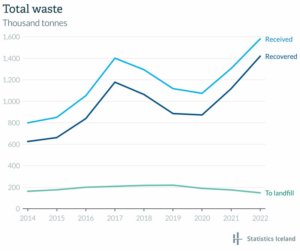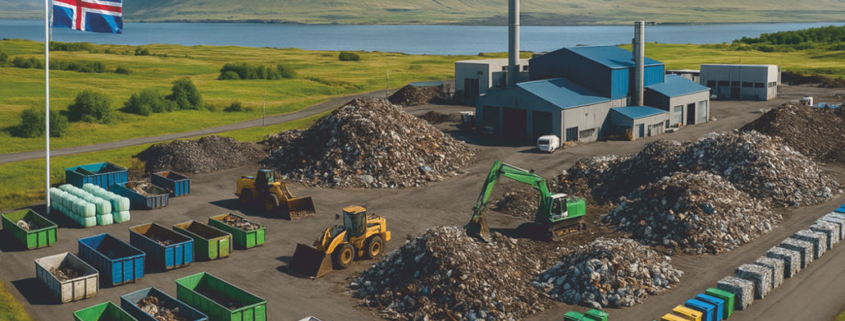Iceland Is Reducing Landfill Waste
As reported by Statistics Iceland in February this year, less than ten percent of waste went to landfill sites in 2022. More recent data is not yet available.
In that year, the Icelandic waste processing facilities received 1.581 million tons of waste, Statistics Iceland, the center for official statistics in the country, informed. Of this quantity, 1.420 million tons were recovered, while 147,000 tons were sent to landfill sites. This was 9.3 percent of the total amount processed.
The largest portion of material received was earthen material, gravel, and other material that could be allocated as filling material, which is considered reuse and therefore recovered material. “The proportion of material used for filling has been around 50 percent of the total weight in the preceding years, but was 60 percent of the total in 2022.” Other recycling was 19 percent, and other reuse was nine percent.
Iceland has made significant progress in reducing mixed urban waste sent to landfills since 2019, when almost all mixed urban waste was either landfilled or burned without energy recovery. This category consists of mixed waste from households, community disposal centers, and businesses that are not required to return their waste separately. In 2019, nearly 219,000 tons of waste were sent to landfills – 140,000 tons was mixed urban waste. By 2022, this sort of landfilling had decreased by more than half to about 68,000 tons, Statistics Iceland gave account. “However, in 2022, about 39 percent of mixed urban waste was sent abroad for energy production, which counts as material recovery.”
2023: A new law on waste
In January 2023, the new law on waste in Iceland took effect and came into force at the end of that year. According to the website https://urgangur.is/, it is one of those laws, which are often called “The circular law” (in Icelandic hringrásarlögin). The aim is to reduce the amount of waste generated and promote the creation of a recycling society in the country.
The legal changes were:
- The same sorting system is used throughout the country. Households are to sort waste into at least seven categories: paper, plastic, bio-waste, textile, metals, glass, and hazardous waste.
- The same waste sorting symbols is used for bins and waste containers throughout the country to simplify classification and make it more efficient.
- The local authorities started collecting fees for waste management according to a usage-pricing model known as “Pay as you throw”.
- Workplaces must also sort their waste into seven categories.
- Construction and demolition waste must be sorted into at least the following categories according to the new law: hazardous waste, wood, minerals, metal, glass, plastic and plaster.
- A recycling fee was applied to more packaging, ensuring that manufacturers and importers cover the costs of collecting and recycling packaging.
As described by the Icelandic Ministry of the Environment, Energy and Climate, the national Environment and Energy Agency is responsible for enforcing legislation on waste treatment. “Treatment of waste is aimed at minimizing its production and utilizing resources optimally through waste prevention measures, reusing whatever is possible, recycling of waste materials, utilization of waste for energy production, and finally, disposal where no other routes are possible.” The Icelandic Recycling Fund would handle the administration and allocation of waste treatment fees. Regarding the nationwide system of recycling fees for all disposable drink containers, Recycling Ltd. handles the receipt of drink containers, payment of recycling fees for their return, and prepares their export and sale for recycling.
 2024: A warning report regarding recycling targets
2024: A warning report regarding recycling targets
According to a report by the EFTA Surveillance Authority (ESA) in October 2024, Iceland, as well as Liechtenstein and Norway, would risk missing some of the 2025 targets for the preparation for re-use and recycling of municipal waste, and for the recycling of packaging waste. To support the green transition in the European Union, targets to increase the preparation for re-use and recycling are set under EU waste legislation that has been incorporated into the European Economic Area (EEA) Agreement. As stated, the ESA early warning report is to identify shortfalls and assist the EEA EFTA states in meeting their recycling targets. It is based on underlying assessments by the European Environment Agency, and follows the same approach and methodology as for the European Commission’s assessment of the EU member states. According to the publication (https://www.eftasurv.int/cms/sites/default/files/documents/gopro/Early%20Warning%20Report.pdf), the EEA EFTA states generate significantly higher amounts of municipal waste per person compared to the EU average of 532 kilograms (kg) in 2021. Iceland generated the least amount of municipal waste per person with 659 kg in 2021 (Norway: 736 kg, Liechtenstein: 869 kg).
Iceland is “at risk of missing the municipal waste target, total packaging waste target, as well as the material-specific targets for ferrous metal packaging, glass packaging, and plastic packaging. Despite a decrease in its landfill rate of municipal waste between 2017 and 2021, the 2035 landfill target remains of concern,” the surveillance authority wrote in a factsheet. In 2021, the Icelandic municipal waste recycling rate was 26 percent, while the EEA 2025 target was 55 percent. The situation is similar regarding packaging waste. The recycling rate was 49.8 percent; the 2025 target in the European Economic Area (all 27 EU countries plus Iceland, Liechtenstein and Norway) is 65 percent.
As main challenges and opportunities, ESA identified:
- Assess and precisely define the needs for bio-waste treatment facilities, to ensure sufficient capacities also for the future.
- Implement the planned ban on landfilling of bio-waste.
- Consider financial penalties for municipalities that fail to meet recycling targets.
The report also includes some positive aspects. “Iceland applies a labelling system common to the Nordic countries. Harmonized pictograms facilitate the sorting of waste and incentivize recycling. Iceland took the lead in developing standardized pictograms for beverage packaging with deposits,” the EFTA Surveillance Authority commended the country’s initiative. Furthermore, the Icelandic Environment Agency had published a handbook on the implementation of waste management to help guide the municipalities. “The handbook is regularly updated to reflect legal developments and received feedback.”
Investment opportunities
Foreign direct investments are welcome in the Nordic states. According to the website Invest in Iceland, which is part of Business Iceland (a public-private partnership established to improve the competitiveness of Icelandic companies in foreign markets and to stimulate economic growth through increased exports), the country offers a wide variety of business opportunities within different sectors and regions of Iceland. “A growing number of investors are acquiring stakes in Iceland’s dynamic, high-tech enterprises or making strategic purchases in production and services related to their international activities. Investors have found an investor-friendly environment with high professional standards in all the support services that a business launch needs,” one can read on the homepage (https://www.invest.is).
As underlined, sustainability is a crucial factor, and with 100 percent of electricity production and space heating from renewable hydro or geothermal resources, Iceland can score in the energy sector. “Incentives for green investments and emphasis on fully utilizing all energy and value streams, be it from geothermal power plants or the seafood industry, have generated exciting opportunities.” Eco-industrial parks are developing based on geothermal resources. Combining multiple value streams from geothermal power plants would provide opportunities to create sustainable inputs to diverse processes. Some examples are
- Microalgae cultivation utilizing sustainably sourced electricity, geothermal energy, and CO2.
- Waste-to-value food processing or cultivation based on geothermal heat.
- Liquid fuel production using electricity and CO2.
- Algae-based cosmetic production.
Export sectors
Moreover, Business Iceland, which has several agreements with the Ministry of Culture and Business Affairs, will continue to support the international reach of the six key areas: Energy & Green Solutions, Innovation, Creative Industries, Tourism, Fisheries, and Food & Natural Products. For more information: https://www.islandsstofa.is/en.
(Published in GLOBAL RECYCLING Magazine 2/2025, Page 24, Photo: MSV, AI-generated)



